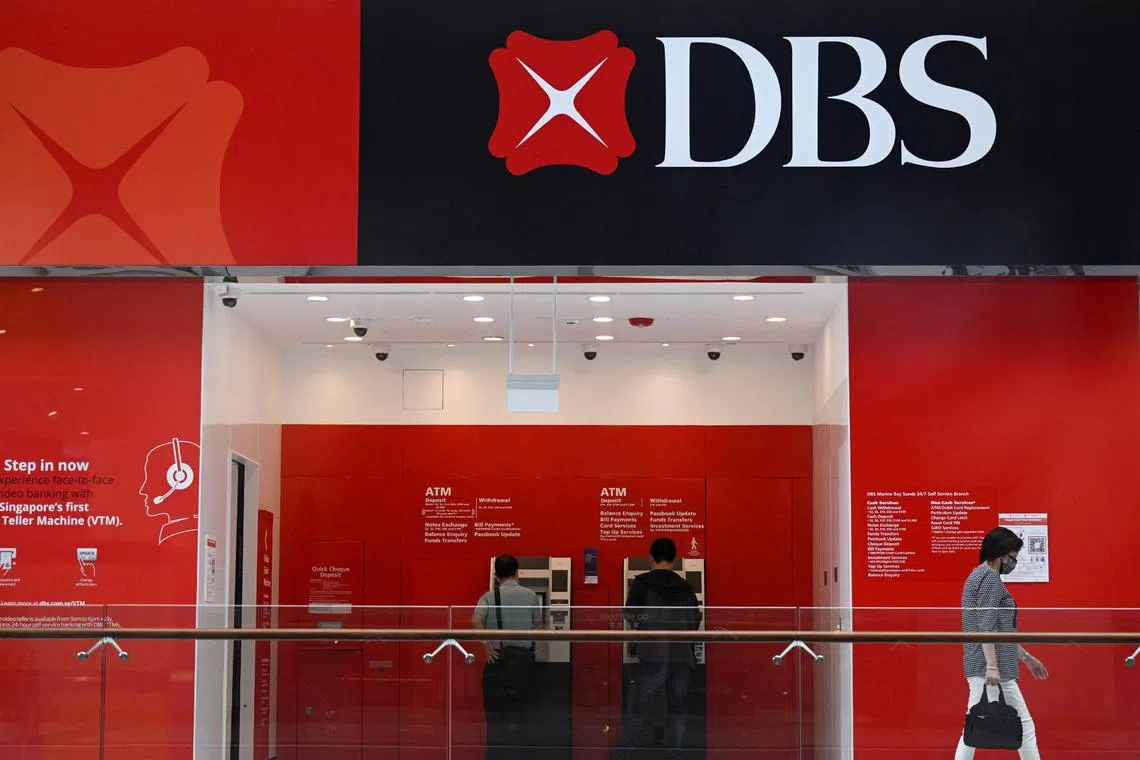DBS stock jumps on $3b share buyback plan, record $3.03b quarterly profit
Sign up now: Get ST's newsletters delivered to your inbox

DBS sees an upside to its 2025 profit when Donald Trump takes office as US president next year, as his policies could spell fewer interest rate cuts by the Federal Reserve.
PHOTO: REUTERS
SINGAPORE – DBS Group Holdings unveiled a multibillion dollar share-buyback programme, as wealth management fees and trading income drove quarterly earnings past the $3 billion mark for the first time.
Its shares hit a record on the share buyback plan and higher-than-forecast profit. They closed at $41.70 on Nov 7, up 6.5 per cent. The stock has gained more than 37 per cent this year.
DBS, the first local lender to report third-quarter results, said net profit surged 15 per cent to $3.03 billion, beating the mean estimate of nearly $2.8 billion from five analysts, according to LSEG data.
It also topped the previous quarterly record of $2.96 billion set in the first quarter of 2024, even though its net interest margin, a key profitability gauge, declined to 2.11 per cent during the third quarter from 2.19 per cent the same quarter a year earlier.
Net profit for the nine months to Sept 30 rose 11 per cent year on year to a record $8.79 billion.
The strong result came on the back of record fee income driven by wealth management, higher treasury customer sales and increased markets trading income.
DBS sees an upside to its 2025 profit when Donald Trump takes office as US president next year, as his policies could spell fewer interest rate cuts by the Federal Reserve that translate into higher net interest margin.
The incoming Trump administration is generally expected to adopt stricter immigration policies and impose more tariffs that could spur inflation, as well as increased deficit spending, DBS chief executive Piyush Gupta said in a briefing on DBS’ results.
“If that is the case, then it is possible that the Fed monetary policy might stay tighter than is currently being projected,” he added. “I think higher interest rate environment is generally better for DBS.”
Nevertheless, Mr Gupta said DBS, with operations across the region from Singapore to China, must be wary of legal and regulatory risks under Trump’s administration.
DBS forecast 2025 net profit to be below 2024 levels due to a 15 per cent global minimum corporate tax being introduced by Singapore from January and imposed on multinational companies including DBS. Pre-tax profit and group net interest income will be around 2024 levels, according to Mr Gupta’s observation slides accompanying the results.
Net interest margin will see a slight decline that could be mostly offset by loan growth, he added.
Non-interest income for the commercial book will grow at “high-single digits” next year, led by wealth management fees and treasury customer sales, he said.
DBS, which is South-east Asia’s biggest bank, announced a quarterly dividend of 54 cents per share, up from 48 cents declared the same quarter a year ago. The third-quarter dividend will be paid out on or about Nov 25.
The bank announced that its board had established a new share buyback programme of $3 billion.
Similar to other firms, DBS periodically buys back its stock in the open market. This is the first time, however, that repurchased shares will be cancelled. Post-buyback, DBS will retain about $6 billion in excess capital, according to Bloomberg Intelligence analyst Rena Kwok.
“The new buyback programme we announced today is underpinned by our strong capital position and ongoing earnings generation, and it is another affirmation of our commitment to capital management,” Mr Gupta said.
He said there is no timeframe for the buybacks to take place and the programme could take “a few years to do”.
He added that “any time is a good time”, given DBS’ strong fundamentals but noted that the bank will be thoughtful and prudent about when it chooses to buy back its shares.
DBS said the programme is expected to provide a “permanent lift” to its earnings per share as well as return on equity.
Asked why the bank opted for a buyback instead of paying out the excess capital to shareholders via a special dividend, deputy CEO Tan Su Shan, who will take over from Mr Gupta in March 2025, said: “The buyback programme expands our toolkit for capital management. The considerable amount of capital we have returned in recent years has been a distinguishing hallmark that remains well-supported by our financial strength.”
Jefferies equity analysts Sam Wong and Shujin Chen said in a research note following the results that they expected a positive share price reaction.
“This is a very strong set with results, with positive surprise in capital return,” they said in the note.
Morgan Stanley analysts said that while the share repurchase programme is a “positive surprise”, the value creation is limited given the bank’s high valuation. DBS is trading at more than 1.7 times its book value, the highest among the three local banks.
OCBC Bank and UOB are scheduled to report their quarterly results on Nov 8. REUTERS, BLOOMBERG


